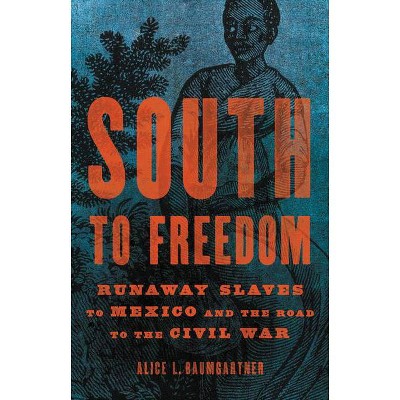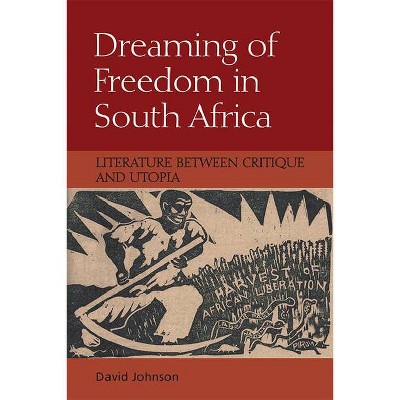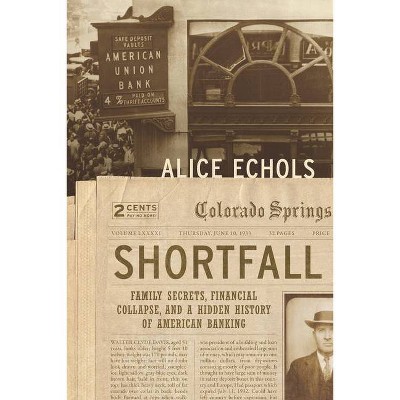South to Freedom - by Alice L Baumgartner (Hardcover)

Similar Products
Products of same category from the store
AllProduct info
<p/><br></br><p><b> About the Book </b></p></br></br>"The Underground Railroad to the North was salvation for many US slaves before the Civil War. But during the same decades, thousands of people in the south-central United States escaped slavery not by heading north but by crossing the southern border into Mexico. In South to Freedom historian Alice Baumgartner tells the story of Mexico's rise as an antislavery republic and a promised land for enslaved people in North America. She describes how Mexico's abolition of slavery challenged US institutions and helped to set the international stage for the US Civil War. In 1837, shortly after Texas rebelled against Mexican rule, Mexico's Congress formally abolished slavery, and enslaved people began to head south. Some were helped by free blacks, ship captains, Mexicans, Germans, gamblers, preachers, mail riders, and other "lurking scoundrels," but most escaped by their own ingenuity -- with stolen rifles, forged slave passes, and, in one instance, a wig made from horsehair and pitch. As they fled across the Rio Grande, and the US government failed to secure their return, their owners began to suspect an international conspiracy against the "peculiar institution." Meanwhile, Northern Congressmen balked at reestablishing slavery in the Southwestern territories taken from Mexico after the Mexican-American War. Feeling increasingly embattled, slavers in Texas and Louisiana came to believe that their interests would best be protected outside the union. With the Southern slave regime under pressure from both the north and south, the conditions were in place for the coming of the US Civil War. Today, our attention is fixed on people seeking opportunity by moving north across our southern border, but South to Freedom reveals what happened when the reverse was true: when American slaves fled "the land of the free" for freedom in Mexico"--<p/><br></br><p><b> Book Synopsis </b></p></br></br><b>A brilliant and surprising account of the coming of the American Civil War, showing the crucial role of slaves who escaped to Mexico.</b> <p/>The Underground Railroad to the North promised salvation to many American slaves before the Civil War. But thousands of people in the south-central United States escaped slavery not by heading north but by crossing the southern border into Mexico, where slavery was abolished in 1837. <p/>In <i>South to Freedom, </i> historian Alice L. Baumgartner tells the story of why Mexico abolished slavery and how its increasingly radical antislavery policies fueled the sectional crisis in the United States. Southerners hoped that annexing Texas and invading Mexico in the 1840s would stop runaways and secure slavery's future. Instead, the seizure of Alta California and Nuevo México upset the delicate political balance between free and slave states. This is a revelatory and essential new perspective on antebellum America and the causes of the Civil War.<p/><br></br><p><b> Review Quotes </b></p></br></br><br><i>South to Freedom</i> reorders the way we should think and teach about the slavery expansion crisis in the middle of the nineteenth century. Indeed, it reorders how to think about the huge question of the coming of the American Civil War. Not many books these days can make that claim. With astonishing research and graceful writing, this one can.--<b>David W. Blight, Pulitzer Prize-winning author of</b>, <i><b>Frederick Douglass: Prophet of Freedom</b></i><br><br>"Baumgartner presents a convincing case that Mexico shaped the freedom dreams of enslaved people in states like Texas and Louisiana while invoking nightmares of emancipation and slave revolt in the minds of white Southern enslavers....<i>South to Freedom</i> is a valuable contribution. It provides us with a fuller understanding of slave flight in this area and offers much needed insight on how enslaved peoples' escape to Mexico shaped the multiple meanings of freedom for the enslaved. Most importantly, it suggests a revised narrative of the significance of the flight of enslaved people to Mexico in shaping the political events leading up to the Civil War."--<i><b>Black Perspectives</b></i><br><br>"A meticulously researched monograph that examines the political and diplomatic relations between Mexico and the United States to explain how Black movement south paved the road to conflicts such as the Texas Revolution, the Mexican-American War, and ultimately the Civil War....<i>South to Freedom</i> makes a significant contribution to borderlands history."--<i><b>Los Angeles Review of Books</b></i><br><br>"Baumgartner brilliantly enhances our understanding of the antebellum period and the Civil War by turning toward 'slavery's other border.'"--<i><b>National Book Review</b></i><br><br>"Baumgartner is a rising star in an emerging generation of historians who focus on the social forces underlying political conflict....She reverses the contemporary narrative that assumes U.S. norms and institutions are superior: in the mid-nineteenth century, Mexico was a safe haven for fugitives fleeing oppression, and the Mexican constitution was more consistent in defending universal rights than were U.S. laws."--<i><b>Foreign Affairs</b></i><br><br>"Baumgartner's book explores an underrecognized period when the US couldn't so easily claim a position of moral leadership."--<i><b>Literary Hub</b></i><br><br>"Baumgartner's debut book deftly traces parallels between Mexico and the U.S., examining why both permitted and later abolished slavery while offering insights on how the past continues to shape the two countries' relationship."--<i><b>Smithsonian</b></i><br><br>"Gripping and poignant....Unlike many experts who study the U.S.-Mexico borderlands, [Ms. Baumgartner] has crafted her book from Mexican as well as American archival collections, and she is deeply versed in the secondary historical literature of both countries....Ms. Baumgartner describes, with skill and great sensitivity, the experiences of those enslaved men and women who, in resisting their oppression, bravely quit the United States altogether. Their stories challenge the glib assumption held by many Americans--those of the 19th century as well as the 21st--who have long taken for granted the idea of Mexican national inferiority. Most of all, their accounts serve as a stark reminder of the severely circumscribed nature of liberty in the antebellum United States and its tragic costs not only for the enslaved but also the republic itself."--<i><b>The Wall Street Journal</b></i><br><br>"Scholars of the Underground Railroad have long known that a small stream of runaways escaped to Mexico, but Alice Baumgartner's <i>South to Freedom: Runaway Slaves</i> to Mexico and the Road to the Civil War offers its first full accounting....It is primarily concerned with understanding why the U.S. failed to stop slavery's expansion, why Mexico did, and using that knowledge to cast the coming of the Civil War in a new light....Baumgartner has achieved a rare thing: She has made an important academic contribution, while also writing in beautiful, accessible prose."--<i><b>The New Republic</b></i><br><br>"The story of how Black people in a slaveholding society affected federal policy by their movements, by their defiance and by their very existence has been told before. But rarely has this story been told as compassionately, or rendered as beautifully....Masterfully researched....Baumgartner's important conclusion is that we must reconceive the impact of the supposedly powerless on the economically and politically powerful."--<i><b>The New York Times Book Review</b></i><br><p/><br></br><p><b> About the Author </b></p></br></br><b>Alice L. Baumgartner</b> is assistant professor of history at the University of Southern California. She received an MPhil in history from Oxford, where she was a Rhodes scholar, and a PhD in history from Yale University. She lives in Los Angeles, California.
Price History
Price Archive shows prices from various stores, lets you see history and find the cheapest. There is no actual sale on the website. For all support, inquiry and suggestion messages communication@pricearchive.us




















